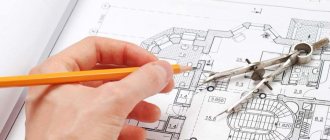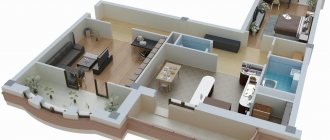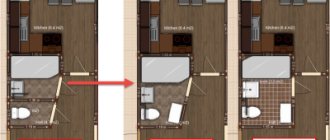Home / Real estate / Purchasing real estate / Buying an apartment
Back
Published: 12/05/2017
Reading time: 5 min
0
87
It is quite difficult to find an apartment that will fully meet the requirements and desires of a particular buyer. It is for this reason that quite often owners resort to the procedure of redevelopment of their existing square meters, but do not always formalize this action from the point of view of the law.
- What redevelopments are illegal?
- What are the risks when buying an apartment with illegal redevelopment?
- How to buy an apartment with illegal redevelopment?
- Fines for illegal redevelopment
How to sell an apartment with illegal redevelopment
The official status of the redevelopment only indicates that the corresponding changes were made with the participation and agreement of the authorized government bodies.
For illegal redevelopment, administrative and, in some cases, criminal liability is established.
However, this circumstance does not in any way affect the right to dispose of property. The only difficulty when selling a home with illegal redevelopment is that it is difficult to find a buyer willing to take on the consequences and responsibility.
What is the illegality of redevelopment? This condition can be identified quite simply by the following signs:
- the actual layout does not correspond to the technical documentation;
- technical documentation is lost or not updated;
- Among the documents for the apartment there is no corresponding decision from the housing inspection.
It is worth noting that the law requires that the survey of the layout by BTI employees be carried out at least once every 5 years.
So, if the technical plan of the apartment, which the seller has in his hands, is more than 5 years old, then this is also a circumstance sufficient for holding him liable.
If you convince the buyer to buy an apartment, then the transaction is completed on a general basis. At the same time, the fact of illegal redevelopment will have to be hidden when registering the transaction, which already indicates the incomplete legitimacy of the transaction.
In addition, such a sale will only be possible at a deep discount. So it is not profitable for every seller to sell an apartment with an illegal layout. It will be cheaper to legalize it through the state housing inspection body or through the court.
Illegal redevelopment in a mortgaged apartment
The biggest troubles await buyers who are ready to make a purchase with a mortgage. In this case, documents for the selected square meters are submitted to the bank for approval. If after registration of the mortgage it becomes clear that there are unapproved redevelopments in the apartment, then the agreement with the bank may be in danger of being terminated.
It's all about the liquidity of such real estate. The bank is not interested in registering illegal alterations at its own expense and incurring losses. Mortgage loans are much more readily issued on the security of purchased real estate with an impeccable package of documents. That is why, by agreeing to purchase an apartment with unapproved modifications to the mortgage, the buyer is at great risk.
All the most important characteristics of an apartment are reflected in its BTI passport, as well as in the cadastral passport. These passports must be issued during the acquisition of property rights. Without them, you cannot make any real estate transactions. When the characteristics of an apartment change, this automatically invalidates its passports. Consequently, the owner, with any intention to dispose of the property, may find himself in a difficult situation.
If you leave everything as it is and do not issue new passports, then in the future it will not be possible to simply sell, buy, mortgage, or inherit an apartment. If the buyer even agrees to formalize the transaction in this form, he will demand a serious discount in order to then use this money to complete the approval on his own.
In other words, housing loses its liquidity, becomes cheaper and can only be sold at a discount, which is extremely unprofitable for the owner who invested his money in it. Whereas a properly executed redevelopment sharply increases the liquidity of an apartment, because apartments with successful remodeling are usually more expensive, unlike standard options with a standard set of shortcomings.
To issue or...?
Summarizing the above, it is important to note that the obligation to register redevelopment always lies with the owner himself. You can use your living space for as long as you like without suffering at all from inaccuracies in the documents, but in the future this problem will certainly manifest itself, and it is impossible to say now how much it will cost to eliminate it.
If you have any questions about purchasing an apartment with illegal redevelopment, our duty lawyer is ready to answer them promptly.
MrHamster/Depositphotos
It is impossible to invalidate the transaction because you are purchasing the property in the form in which it was inspected before purchase. In order to resolve the issue of redevelopment, it is necessary to either legalize it, or simply return everything to its previous position.
Do small redevelopments need to be legalized?
Is it necessary to approve the integration of a bathroom within the same boundaries?
Redevelopment, even uncoordinated or illegal (not in compliance with SNiP), cannot be grounds for terminating the sales contract or invalidating the transaction. The new owner has every right to legalize the redevelopment by paying a fine for the fact that he or the previous owner did not do this in a timely manner and did not undergo preliminary approval.
The sale of housing with illegal redevelopment is possible; the legislation does not contain a ban on transactions with such real estate.
At the same time, the purchaser of such an apartment should understand that it is he who will have to decide in the future the issue of approving the redevelopment carried out by the seller in accordance with the procedure established by law, and if the competent authorities refuse to approve it, bringing the apartment to its original condition.
Is it possible to demolish the wall between the bathroom and kitchen in Khrushchev?
Do I need to obtain permission to glaze a balcony?
Buying an apartment with illegal redevelopment, consequences
Above we looked at the issue from the seller's point of view. In turn, buyers of such apartments should also be aware of the undesirable consequences. Mainly it lies in the liability established by law for illegal planning. So:
- After purchasing such housing, the buyer himself will bear responsibility for illegal planning, unless he proves that this phenomenon occurred before the time of purchase. However, it is quite difficult to prove this, and to find a culprit who admits his guilt too. So the buyer will have to answer and reap the consequences.
- In the future, it will be difficult for the buyer to sell such an apartment, since it has already been said that not everyone will want to purchase housing in an apartment building with illegal characteristics.
- It will be difficult to legalize such redevelopment, since the new owner will not be aware of all the nuances of the illegal redevelopment.
Otherwise, if neighbors or other interested parties do not report the fact of illegal redevelopment, then there will be no problems. But still the risk of being punished remains.
For this reason, before buying any apartment, you must carefully monitor the technical documentation to ensure that the current floor plan matches the information reflected in the technical plan.
Is it necessary to legalize the redevelopment of an apartment when selling it?
As has already been said, it is, in principle, possible to sell an apartment with illegal redevelopment, albeit with reservations, since this operation is on the verge of legality. However, this is fraught with undesirable consequences, primarily for the buyer. For this reason, it will be quite difficult to find a buyer who will agree to buy a home with illegal redevelopment.
Experts do not recommend taking risks and selling an apartment with remodeling without permission. After all, the consequences of selling without legalized redevelopment can strike at any time.
In what cases is redevelopment necessary? Real estate experts recommend legalization in the following cases:
- when the fact of illegal redevelopment scares away buyers;
- when the seller does not agree to discounts;
- when the degree of change is serious and affects the supporting structures of the building;
- when the buyer requires redevelopment and is ready to pay all costs.
When it comes to legalizing redevelopment, many are put off by the cost of the procedure. So, this procedure requires a project, which is drawn up by private architects, the cost of whose services is quite high. If legalization is carried out through the court, then you will need to hire a lawyer, whose services are also not cheap.
In general, today the cost of the legalization procedure is estimated from 35–40 to 70–90 thousand rubles. It all depends on the extent of the changes made and the area of the housing itself.
Where to go to legalize changes to the layout
Without approval from the authorized body, it will be impossible to legitimize the plan. The following bodies have the authority to legitimize illegal changes made to the layout of an apartment:
- housing inspection;
- court.
But as practice shows, it is advisable to contact the housing inspectorate upon making changes before carrying out construction work. After the fact, the housing organization almost always refuses. However, real estate experts know that if all documents are prepared on the current date, such a procedure can be carried out as if the redevelopment was being carried out at the time of application.
What is needed for this? So, you need to collect the following package of documents:
- title documents for the apartment;
- technical plan of the apartment;
- a project compiled by professional specialists;
- act of approval of construction work;
- permission from the local authority to carry out construction work;
- consent of all owners in writing if the apartment belongs to several persons.
Upon provision of the specified documents, the housing inspectorate conducts a study within two months and issues permission for redevelopment. In the future, you need to contact the BTI and make appropriate changes to the technical plan, that is, you need to update it.
Only after receiving the technical plan will it be possible to register changes with the cadastral authority. After this, the apartment can be sold without problems.
It is worth noting that if the housing inspector decides to check your apartment and notices changes in its layout, an administrative fine may be imposed. In this case, you can continue the legalization procedure only after payment.
What are the dangers of illegal redevelopment and how to register it?
Remodeling an apartment in an apartment building is a complex process. Many people decide to do it without the necessary approvals. The editors of IRN.RU found out what this could mean and how to formalize the redevelopment that has already been carried out.
From a fine to loss of an apartment
According to the head of the analytical Dmitry Taganov, dubious redevelopments most often become known through statements from neighbors. For example, a constantly working overhead jackhammer and a large amount of construction waste being removed may lead to suspicions of demolition of a load-bearing wall. The Moscow Housing Inspectorate confirms that this is how they most often find out about violations. About 10,000 such requests are recorded per year. In approximately half of the cases, it turns out that the repairs are actually carried out with violations. In addition, illegal redevelopment often becomes known when an apartment is sold.
Owners need to keep in mind that for illegal redevelopment, in any case, they will have to pay a fine of 2000 - 2500 rubles, even if they did not do anything prohibited during the redevelopment or if the owner himself contacted the Moscow Housing Inspectorate in fact.
If during the inspection it turns out that changes prohibited by law were made during the redevelopment (read about them in the article “Redevelopment can kill and deprive you of housing”), a decree will be issued to return the apartment to its original form at the expense of the owner. If the owner does not do this within the established time frame (usually six months), the court may decide to sell the apartment at auction. The money will be returned to its owner, minus the cost of correcting unauthorized changes. This amount will be transferred to the new owner, who will do the repairs.
The first such decision was made in 2013 in relation to two apartment owners in Biryulevo, who demolished a load-bearing wall. It is worth noting that before this, for three years, the Moscow Housing Inspectorate tried to resolve this issue without extreme measures, but the owners of the apartment did not make contact and ignored all the instructions.
Another decision to sell an apartment under the hammer was made in 2016 against a resident of the Voykovsky district. He combined the bathroom with the toilet, simultaneously expanding the area of the bathroom to include a corridor (this is permissible), as well as part of the kitchen and living room, which is prohibited by law. At the same time, the owner did not allow inspectors to visit him for a year and a half and did not comply with the order to restore the bathroom to its previous form.
Discount for your troubles
Of course, such serious measures are rarely used. However, people who do not complete the redevelopment in time may encounter other problems, for example, when selling their home. Alexander Moskatov, managing director of the brokerage department, says that the mere presence of redevelopment is not a contraindication for sale. However, the new owner who bought such an apartment, according to the Housing Code, is obliged to either bring the housing into proper condition, in accordance with the current floor plan, or legalize this redevelopment within six months. If he does not do this, then he will no longer be able to sell the apartment in the same form if necessary.
The expert notes that many buyers, in principle, do not consider purchasing an apartment with illegal redevelopment, because they do not want to get involved in unnecessary troubles. This significantly reduces interest in an apartment in an already difficult market. So for illegal redevelopment you will have to give a significant discount - 15-30%, depending on its complexity.
Problems with your mortgage
Private realtor Elena Kachkova spoke about how she once sold an apartment with redevelopment and the deal fell through due to the bank’s refusal to provide a mortgage. The owner turned a three-room apartment into a two-room apartment, and due to the demolition of the walls, the living area also changed. According to the property documents, the housing was a three-ruble apartment with an area of 60.9 square meters. meters, and according to the fact and technical passport - a two-room apartment of 60.5 square meters. meters. The buyer was satisfied with the apartment itself and was not bothered by the redevelopment, but the bank refused to issue a loan due to a mismatch in area. According to the realtor, it is not so difficult to register a new title with updated parameters and a technical passport in hand, but the buyer did not want to wait and preferred to choose another apartment. Therefore, all documents before the sale must be taken care of in advance.
Banks, in principle, do not really like apartments with illegal alterations. According to Alexander Moskatov, the loan will definitely be denied if the changes do not comply with the law. If the redevelopment does not affect anything prohibited, the loan will most likely be given, but the loan agreement will include a clause obliging the borrower to legalize the redevelopment within a certain period of time (usually six months) and submit the relevant documents to the bank.
Mortgage borrowers who have already bought an apartment and want to change it should also pay special attention to the design of redevelopment. All redevelopment must be coordinated with the bank, and a bank employee has the right to come to the secured apartment with an inspection. If the bank becomes aware of an illegal change in the layout of the apartment, the consequences may be different, depending on the circumstances: forced approval, termination of the contract with the payment of a penalty, etc. The bank will definitely report violations to the Housing Inspectorate, due to which administrative liability will be added to the “mortgage” problems.
With or without trial
According to the law, it is possible to arrange redevelopment after the fact in court. To do this, the apartment owner must contact the architectural department of the administration with an application to legalize the redevelopment. It must indicate that the restructuring has already been carried out.
A BTI specialist must go to the address and take measurements of the changes made. Subsequently, they will be used when printing a new technical passport. It is necessary to obtain permits from sanitary inspection, fire service and management company. Specialists must inspect the alterations and recognize that they comply with urban planning, sanitary and fire standards, do not pose a danger to the integrity of the building, and do not cause inconvenience to neighbors.
In parallel with obtaining permits, the apartment owner needs to order a project. It is produced either by BTI or a specialized agency. An important point: when legalizing perestroika through the court, you cannot get away with a simple sketch - you need a project, even if the most minor changes are made. With these documents, you need to submit a petition to the district court to legalize the uncoordinated redevelopment. According to Alexander Moskatov, a decision is usually made within a month.
However, in fact, people often manage to legalize redevelopment without court; in fact, it is formalized retroactively, as if the redevelopment had not yet taken place. However, such a trick can be revealed. For example, a BTI engineer can visit an apartment after submitting documents for a permit to assess the possibility of redevelopment.
According to experts, in all cases it is better to formalize the redevelopment before it is carried out. It is worth keeping in mind that this applies not only to old apartments, but also to new buildings with a so-called “free” layout - after all, in fact, the developer initially lays down and approves his apartment plan, and any discrepancies with it are redevelopment (see “Even in There are no “free layouts” in new buildings).
Mortgage promotions and special offers
TableMap
| Project | Special offer |
| May resort town | Mortgage from 4.5% |
| World of Mitino | Installment without %! |
| Double | Mortgage from 4.5% |
| Residential area D1 | Mortgage 0.5% for 12 months |
| Tsarskaya Square | Mortgage under the state program from 5.99%! |
| iLove | Mortgage 5.85% |
| Heart of the capital | Mortgage from 0.1% |
| District "Spanish Quarters" | Mortgage from 2.55% for the entire term. |
| District "Scandinavia" | Mortgage from 2.55% for the entire term |
| Fresh | Mortgage from 0.1% |
| Prokshino | Mortgage from 2.55% for the entire term |
Data source: Real estate database IRN.RU
show all
What redevelopment is considered permitted?
According to the law, redevelopment is considered permitted if it was carried out in accordance with the requirements of the law and with the receipt of permits from authorized government bodies.
So, if the owner has the following permissions, then the redevelopment is considered permitted:
- permission from the housing inspection to change the floor plan;
- permission from local authorities to carry out construction work;
- act of approval of redevelopment with the housing inspection.
There is a popular belief that the legality of redevelopment depends on the extent of changes made to the floor plan. So, if the changes do not affect the supporting structures and do not change the size of the living space, then it is automatically considered permitted. However, this is not entirely correct.
The minimum number of changes only facilitates the legalization procedure, and does not abolish it altogether. Thus, if the redevelopment has the following signs, then it can be legalized without problems:
- the positions of the bathroom were changed without affecting the general living area;
- the area of the openings was reduced;
- The height of the premises was reduced.
In all other cases, it will not be possible to achieve legalization without sanctions from the authorized bodies.
What should a buyer of a remodeled apartment do?
When purchasing housing with obviously illegal redevelopment, the buyer must be prepared not only to pay a fine if they are discovered by the housing inspector, but also to eliminate everything that cannot be agreed upon. Those changes that can be legalized must be legalized. The process of legitimizing changes is no different from the initial approval. Especially if the housing inspection has not yet drawn up an act on illegal alterations. The new owner must:
- Order a technical passport from the BTI;
- Order from a developer or architectural bureau a project that corresponds to a real renovation;
- Coordinate the project with all authorities that supervise the elements of the repair (gorgaz, electricity supply company, water utility, etc.);
- Order an extract from the Unified State Register of Real Estate;
- Submit documents to the housing inspectorate and obtain permission to remodel;
- Submit documents and receive a new registration certificate.
Attention! If the apartment is mortgaged, then approval from the bank and the insurance company will be required.
All changes that cannot be agreed upon will have to be eliminated. If, for example, the kitchen is combined with a room, or a bathroom, the bathroom is moved so that it is above the living room. However, they can be brought into a form that can then be legitimized by the project.
When do you need to draw up a redevelopment project?
The law does not precisely define in which cases owners can order a special project from architects. However, there are cases when this must be done:
- if changes affect supporting structures;
- if the area of the premises suitable for living changes;
- when the location of gas equipment changes;
- when openings widen, the height of the rooms increases;
- if the layout of the rooms changes.
In these cases, the project must be drawn up by specialists. This requirement follows from the fact that specialists will draw up a change plan in accordance with the law.
Owners may not take into account some building codes. Specialists can advise on redevelopment issues, indicate which changes are permissible and which are not.
In all other cases, as a general rule, the project can be drawn up by the owner himself by hand or on a computer. However, this is not recommended, since about 80% of such projects are rejected by the housing inspection.
How to detect illegal redevelopment?
- During the redevelopment process, changes in the characteristics of adjacent structures may occur. For example, the sound permeability of the wall adjacent to the neighbors will increase, or the ventilation will deteriorate, or in some other way the neighbors will be able to assume that redevelopment has occurred in the neighboring apartment and file a complaint with the housing inspector. Upon receipt of an application to the apartment, a commission will be sent that will check the apartment plan with its actual condition, and if discrepancies are found, issue a fine and issue an order to eliminate the inconsistencies in the documents within up to 6 months or restore the apartment to its original condition.
- Due to gross violations of building codes and regulations, an accident will occur, or a failure in the work of public communications will occur, which will require the intervention of utility services, and then the previous scenario will be completely repeated, with the difference that the amount of the fine will be greater, the alteration itself may not be able to be eliminated , as well as to agree.
- During the reconciliation of meter readings, redevelopment can be detected by a utility worker, after which an application will be submitted on behalf of the utility service to the housing inspectorate.
Is it possible to buy an apartment with illegal redevelopment with a mortgage?
A mortgage is the purchase and sale of an apartment in which the bank is involved. Of course, not a single bank will agree to issue a loan for an apartment that has legal flaws. Thus, there is no way to obtain a mortgage for an apartment with illegal redevelopment under the law.
On the other hand, it is possible to legalize the redevelopment with the participation of the bank. So, the bank can take on some of the responsibilities in this matter. As practice shows, in most cases the bank makes a decision only after receiving the appropriate permission from the housing inspection.
It is worth keeping in mind that redevelopment of an apartment purchased with a mortgage is carried out only with the permission of the bank. Any additions to the apartment plan must be approved by the bank, taking into account changes in the value of the property.
What is redevelopment?
Not every type of work in an apartment will be related to redevelopment and, therefore, there will be no need to legitimize it.
Redevelopment is a change in the configuration of a room in an apartment building or private building. That is, they made two rooms out of one room, or one room out of two, by demolishing one wall. A separate bathroom was converted into one, and a storage room was installed in the original place.
There is an unacceptable change in the apartment plan - moving the gas stove, moving the heating system to the balcony, demolishing a load-bearing wall. Such types of work are illegal and there is no way to legalize them, because this is a violation of safety regulations not only for one apartment, but also, at least, for a floor in the house.
In addition to redevelopment, the housing complex of the Russian Federation has the concept of “redevelopment”. This means replacing or moving the plumbing system (if you replaced the faucet in the bathroom or kitchen, this is not a renovation), electrical equipment, and technical components. Such changes also need to be made to the technical passport of the apartment.
Possible difficulties
An illegal layout when selling an apartment is fraught with undesirable consequences. So, it is necessary to list the difficulties and undesirable consequences that illegal redevelopment can lead to. They mainly manifest themselves in the responsibility of the owners of such apartments.
To date, the following sanctions have been imposed on persons who have changed the housing plan without permission:
- an administrative fine in the amount of 1.5 to 2 thousand rubles for illegal redevelopment;
- a fine of 4 to 8 thousand for changing the location of gas equipment without the permission of an authorized organization;
- criminal liability if, as a result of an illegal change in the floor plan, harm was caused to the life and health of people.
So it is better to consult with professional architects before drawing up a renovation plan for your home. After all, the possibility of people dying as a result of illegal redevelopment is not just an article in the Criminal Code, but a practically confirmed threat.










